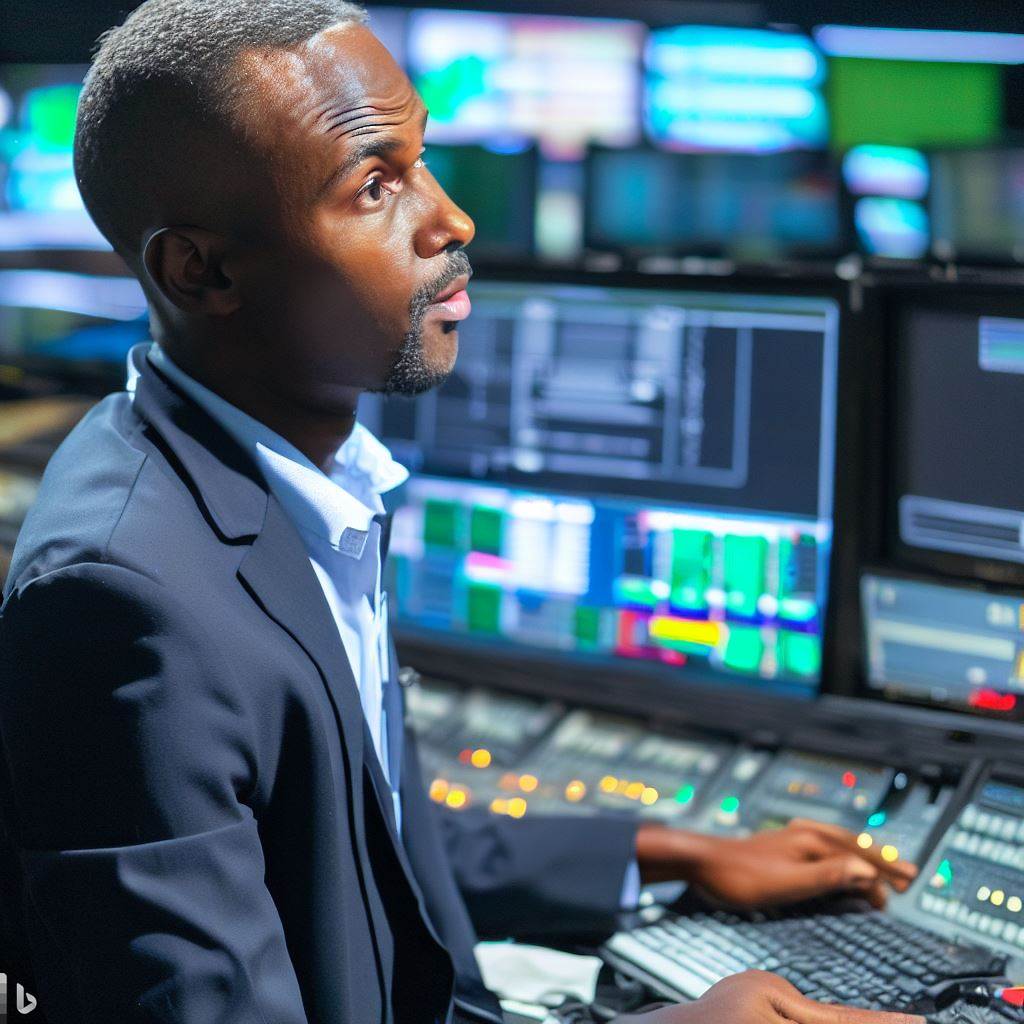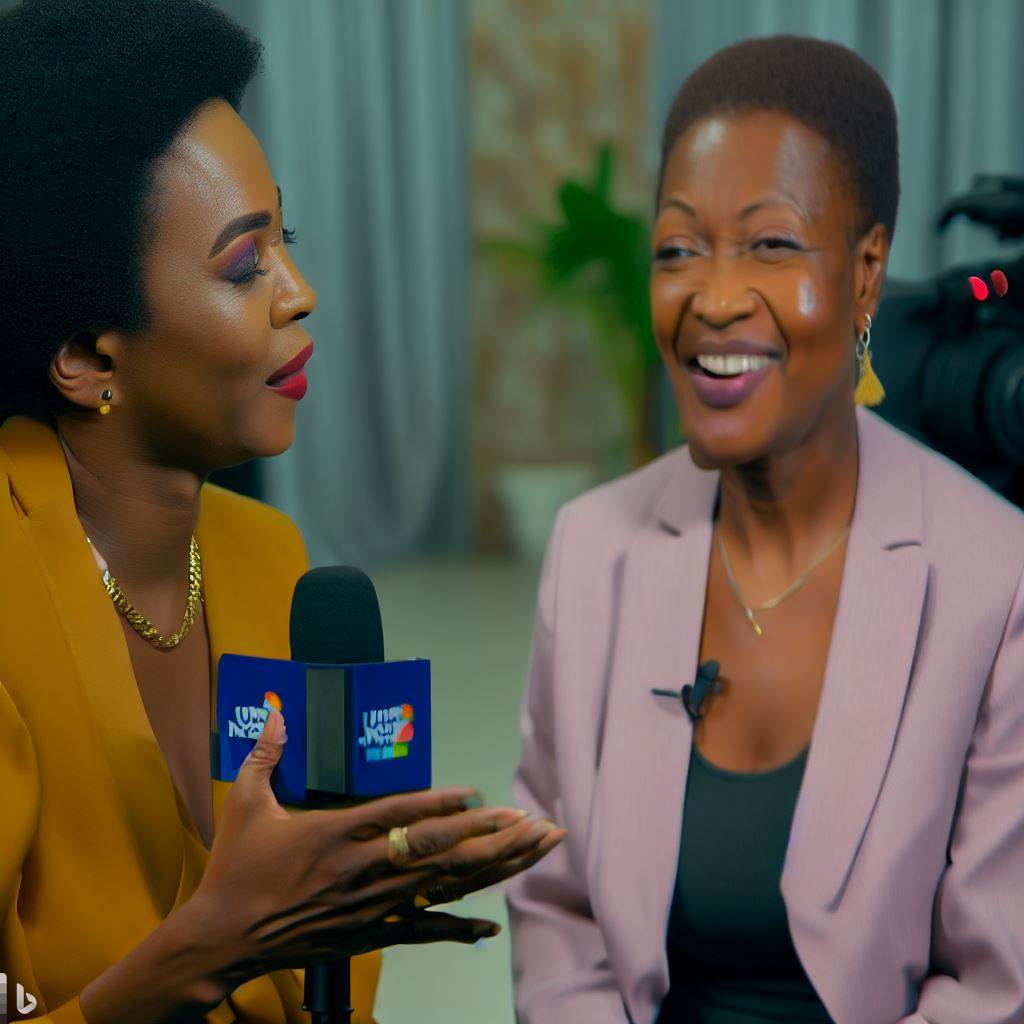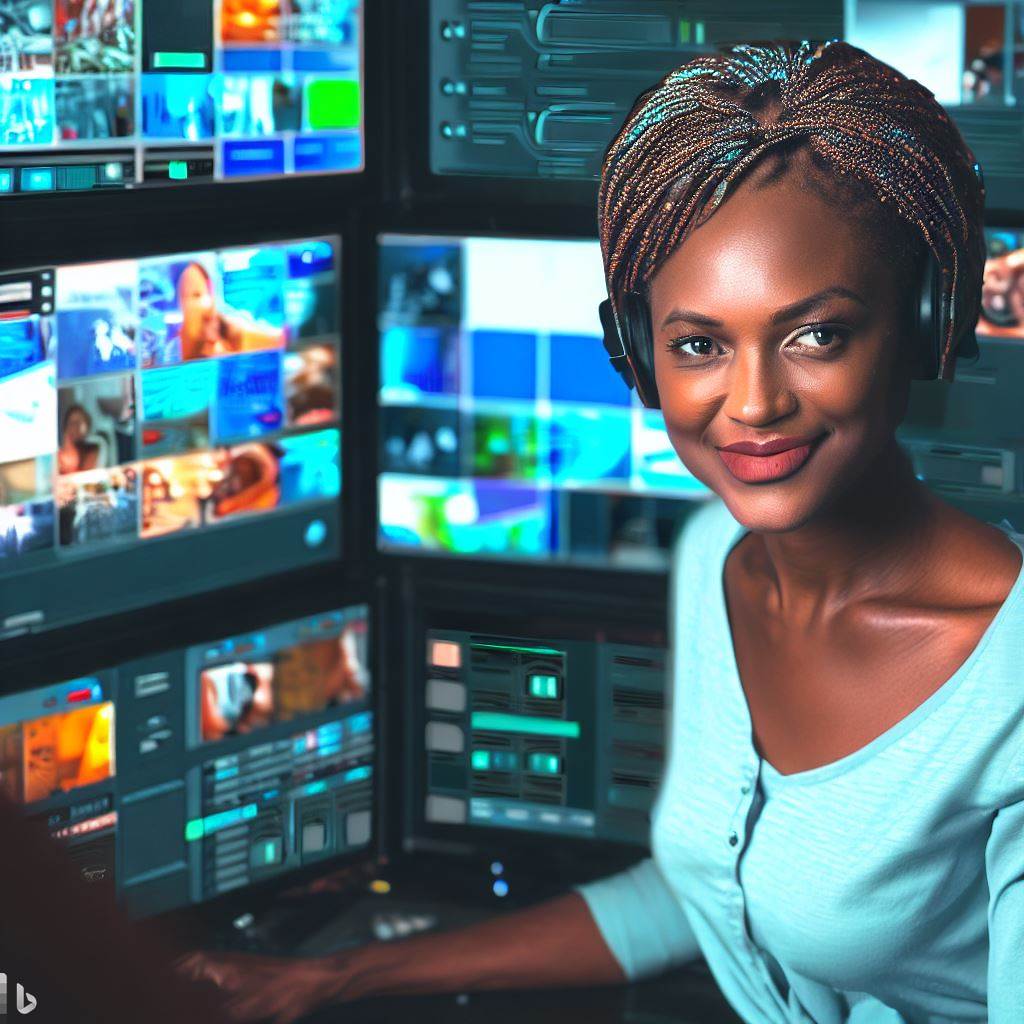Introduction
Definition and role of a television editor
In television production, an editor is responsible for assembling and manipulating raw video footage into a coherent and engaging final product.
They play a crucial role in the storytelling process by selecting the best shots, arranging them in a logical sequence, and adding visual and audio effects.
Importance of television editing in Nigeria’s media industry
Television editing plays a vital role in Nigeria’s media industry as it enhances the overall quality and impact of television programs.
Skilled editors are in high demand to ensure that content is captivating, visually appealing, and effectively communicates the intended message to the audience.
With the increasing competition in the industry, the role of television editors has become even more critical in maintaining high production standards.
Television editing in Nigeria has evolved significantly over the years, thanks to advancements in technology and the increasing number of television stations and production companies.
Editors are now expected to possess a wide range of skills to meet the demands of the industry.
To excel as a television editor in Nigeria, proficiency in using editing software such as Adobe Premiere Pro or Final Cut Pro is essential.
Additionally, editors should have a solid understanding of storytelling techniques, composition, and pacing.
Attention to detail, strong communication skills, and the ability to work collaboratively with other production team members are also vital.
Basically, television editing is a fundamental part of Nigeria’s media industry, and skilled editors are essential for creating compelling and engaging content.
As the industry continues to grow, the demand for talented television editors will remain high.
Therefore, aspiring editors should focus on developing the necessary skills and staying updated with the latest trends and technologies in the field.
Technical Skills
Proficiency in editing software (e.g., Adobe Premiere Pro, Final Cut Pro)
To be a successful television editor in Nigeria, one must possess proficiency in popular editing software such as Adobe Premiere Pro and Final Cut Pro.
These programs are widely used in the industry and offer a wide range of editing tools and features.
Proficiency in this software allows the editor to efficiently navigate the interface, utilize keyboard shortcuts, and access advanced editing functionalities.
Having a deep understanding of these tools can greatly enhance the editor’s productivity and efficiency in delivering quality content.
Ability to work with various video formats and file types
In Nigeria’s television industry, editors should have the ability to work with various video formats and file types.
This skill is essential as different television networks or production companies may have specific requirements and preferences for video formats.
An editor should be knowledgeable on how to handle different file types and effectively convert or transcode them if necessary.
This ensures that the final product meets the technical specifications and requirements of the project.
Knowledge of different editing techniques (e.g., cutting, transitions, color grading)
Having a solid understanding of various editing techniques is crucial for a television editor in Nigeria.
These techniques include cutting, transitions, and color grading.
Cutting involves selecting and organizing video clips to create a cohesive and engaging story.
The editor should know how to make strategic cuts to maintain the flow and pace of the video.
Transitions are used to smoothly transition between different scenes or shots.
The editor must be skilled in choosing and applying transitions that enhance the visual appeal and narrative of the content.
Color grading is the process of manipulating the colors and tones in a video to achieve a desired look or mood.
Being knowledgeable about color grading techniques and tools can greatly enhance the visual quality and overall production value of the content.
Understanding of audio editing and mixing
An often overlooked but important aspect of television editing is audio editing and mixing.
An editor should have a good understanding of audio editing techniques to ensure a balanced and seamless audio experience for the viewers.
This includes tasks such as cleaning up background noise, adjusting audio levels, and synchronizing audio with video.
A skilled editor can enhance the overall audio quality, making the content more immersive and enjoyable for the audience.
Developing these technical skills is essential for anyone aspiring to be a television editor in Nigeria.
Through continuous practice, learning, and hands-on experience, one can master these skills and become a sought-after professional in the industry.
Read: The Role of TV Producers in Nigeria’s Entertainment Growth
Creativity and Storytelling Skills
A skilled television editor in Nigeria must possess a plethora of creativity and storytelling skills.
These are the essence of captivating content that keeps audiences glued to their screens.
Ability to tell compelling stories through video editing
- Capture the viewer’s attention quickly.
- Weave together shots to create a coherent narrative.
- Infuse emotions into the edited material.
Understanding of narrative structure and pacing
- Comprehend the three-act structure: setup, conflict, resolution.
- Master pacing to maintain viewer engagement.
- Emphasize pivotal moments to build suspense.
Proficiency in visual storytelling techniques
- Utilize shot composition to convey emotions and themes.
- Skillfully sequence shots for a smooth visual flow.
- Create symbolism and metaphors through visuals.
Knowledge of current trends and styles in television editing
- Stay updated on the latest industry trends.
- Adapt to evolving editing techniques and technology.
- Embrace diverse editing styles and aesthetics.
In Nigeria’s dynamic television landscape, a television editor’s creative prowess is the key to success.
Whether crafting documentaries, dramas, or news segments, these skills enable them to transform raw footage into captivating stories that resonate with audiences.
A blend of technical expertise and an artistic eye is the recipe for success in this ever-evolving field.
Read: Behind the Scenes: A Day in the Life of a Nigerian TV Producer

Attention to Detail
Attention to detail is a fundamental skill for any television editor, and it plays a significant role in their ability to create compelling content.
The following are specific areas where attention to detail is crucial for television editors in Nigeria:
- Strong organizational skills in managing and categorizing footage: A television editor in Nigeria needs to have excellent organizational skills to effectively manage and categorize the vast amount of footage they work with.
This involves creating a system to easily locate and retrieve clips when needed. - Ability to closely review and analyze footage for errors or inconsistencies: An important skill for a television editor is the ability to meticulously review each shot in the footage to identify errors, such as continuity mistakes or technical issues. This ensures that the final product is seamless and error-free.
- Attention to timing and synchronization of audio and video elements: Television editors play a crucial role in ensuring that the audio and video elements are in perfect sync.
They must have a keen sense of timing and the ability to fine-tune the edits to create a smooth and cohesive viewing experience for the audience. - Skill in identifying and correcting technical issues in post-production: In the post-production stage, television editors often encounter various technical issues such as color correction, audio glitches, or visual effects problems.
A skilled editor must be able to identify and resolve these issues to deliver a high-quality final product.
1. Footage organization
Television editors must possess strong organizational skills to manage the large volume of footage they receive.
They need to develop an efficient system for cataloging and categorizing different shots, making it easier to locate specific scenes when assembling the final product.
2. Error detection
Television editors should have a sharp eye for detail to detect errors or inconsistencies in the footage.
This includes continuity mistakes, such as actors changing positions or props appearing and disappearing.
By spotting these errors, editors can make necessary adjustments to maintain the flow and coherence of the video.
3. Timing and synchronization
An essential aspect of television editing is ensuring that audio and video elements are synchronized.
Editors need to carefully time the transitions between shots, the placement of music or sound effects, and the alignment of dialogue with the lip movements of actors.
Small errors in timing can significantly impact the overall viewing experience.
4. Technical problem-solving
Television editors often encounter technical issues during post-production.
These can include color inconsistencies, audio glitches, or visual effects problems.
By having strong attention to detail, editors can identify and rectify these issues promptly, ensuring a polished final product.
Basically, attention to detail is a critical skill for television editors in Nigeria. From effectively organizing footage to resolving technical issues, editors need to be meticulous in their work.
By paying close attention to detail, editors can produce high-quality content that captivates audiences and meets industry standards.
Read: How to Succeed as a Television Producer in Nigeria
Uncover the Details: How to Handle Challenges: TV Floor Managers in Nigeria
Collaboration and Communication
Ability to work closely with directors, producers, and other team members
As a television editor in Nigeria, it is essential to possess the ability to work closely with directors, producers, and other team members.
Collaboration is key in ensuring a successful production.
Working closely with directors allows the editor to understand their vision for the television show or film.
By actively listening and communicating effectively, the editor can bring that vision to life on screen.
Similarly, collaborating with producers is crucial to ensure that the final product meets the expectations and goals set for the project.
The editor must be open to feedback and suggestions from producers and find a way to incorporate them while maintaining the integrity of the storytelling.
Additionally, effective teamwork with other team members, such as cinematographers, sound designers, and visual effects artists, is necessary.
The editor must be able to communicate their needs and contribute to the overall creative process, ensuring that all elements come together seamlessly.
Effective communication skills in conveying artistic vision and ideas
In the television industry in Nigeria, effective communication skills are vital in conveying artistic vision and ideas to the rest of the team.
The editor must be able to clearly articulate their creative choices.
Through effective communication, the editor can explain how specific edits or manipulations enhance the visual storytelling.
By conveying their ideas, they can ensure that everyone involved understands the desired outcome.
Collaboration requires the ability to translate ideas into actionable tasks and directives.
The editor must possess clarity and persuasive skills to convince others of the effectiveness of their choices.
This skill is even more critical when working with clients who may not have technical expertise but have their own preferences.
The editor must navigate through different tastes and preferences, understand their ideas, and effectively communicate any necessary adaptations to the artistic vision.
Adaptability to client preferences and feedback
In the television industry, being adaptable to client preferences and feedback is essential for a television editor in Nigeria.
Clients play a significant role in shaping the final product, and their satisfaction is paramount.
The editor should be receptive to client feedback and incorporate it into their editing process.
This flexibility ensures that the client’s preferences and expectations are met, resulting in a successful collaboration.
Adaptability also involves understanding and respecting cultural nuances and sensitivities.
Nigeria is a diverse country with a rich cultural heritage, and the editor must be adaptable to different storytelling styles and perspectives.
By adapting to client preferences and feedback, the editor establishes a strong working relationship and builds trust, which can lead to long-term collaborations and repeat clients.
Capacity to meet deadlines and work efficiently in a team environment
Meeting deadlines and working efficiently in a team environment are crucial aspects of being a television editor in Nigeria.
Timelines are often tight, and there is no room for procrastination or delays.
The editor must possess excellent time management skills and be able to prioritize tasks effectively.
This ensures that the editing process remains on schedule and meets production deadlines.
Working efficiently also involves collaborating with team members to streamline workflows and optimize productivity.
The editor must be proactive in finding solutions, overcoming challenges, and contributing to a positive team environment.
In a team setting, effective communication plays a vital role.
By openly sharing progress, challenges, and ideas, the editor fosters a collaborative atmosphere and ensures everyone is on the same page.
The capacity to meet deadlines and work efficiently in a team environment results in a smooth production process with high-quality outputs.
It also strengthens the editor’s reputation and credibility within the industry.
Generally, collaborating and communicating effectively are essential skills for a television editor in Nigeria.
The ability to work closely with directors, producers, and team members, as well as convey artistic vision and adapt to client preferences, contributes to successful productions.
Meeting deadlines and efficiently navigating a team environment further enhance the editor’s abilities and ensure a fulfilling career in the television industry in Nigeria.
Read: Demystifying the Role of a Television Producer in Nigeria
Industry Knowledge
Familiarity with Nigerian television industry standards and regulations
- Television editors in Nigeria need to be familiar with the standards and regulations set by the industry.
- They should understand the guidelines and policies that govern television editing in the country.
- This knowledge ensures that their work complies with the required standards and meets the expectations of the industry.
Awareness of popular television genres and audiences
- Successful television editors in Nigeria must have a good understanding of popular television genres.
- They should be aware of the different types of shows that are popular among Nigerian audiences.
- This knowledge helps editors make informed decisions when it comes to editing content for specific genres.
Understanding of cultural sensitivities and target demographics
- Television editors in Nigeria need to have a deep understanding of cultural sensitivities.
- They should be able to identify and respect cultural norms, values, and beliefs while editing.
- This understanding helps them create content that resonates with the target demographics and avoids any controversies.
Knowledge of current technological advancements in television editing
- Keeping up with the latest technological advancements is crucial for television editors in Nigeria.
- They need to stay updated on the new software, tools, and techniques used in television editing.
- This knowledge allows them to utilize the latest technology to enhance the quality and efficiency of their editing work.
Acquiring and maintaining industry knowledge is essential for television editors in Nigeria to excel in their profession.
Their familiarity with industry standards and regulations ensures that their work aligns with the required guidelines.
Furthermore, their awareness of popular television genres and audiences enables them to make effective editing decisions.
Understanding cultural sensitivities and target demographics helps editors create content that resonates with the audience while respecting their values and beliefs.
Lastly, keeping up with technological advancements allows editors to utilize the latest tools and techniques, enhancing the quality and efficiency of their work.
By continuously updating their industry knowledge, television editors in Nigeria can remain relevant and competitive in the rapidly evolving television industry.
Conclusion
A television editor in Nigeria requires several important skills to succeed in their career.
These include proficiency in video editing software, attention to detail, creativity, time management, and strong communication skills.
Continuous learning and improvement are significant in this field. Technology is constantly evolving, and editors must stay updated with the latest tools and techniques to deliver high-quality work.
They should take advantage of online courses, workshops, and industry events to enhance their skills constantly.
Despite the challenges, pursuing a career in television editing in Nigeria’s dynamic media landscape can be rewarding.
With the rapid growth of the industry and the demand for quality content, there are ample opportunities for talented editors to excel.
If you are passionate about storytelling and have a knack for editing, don’t hesitate to dive into this exciting field.
Build your skills, network with industry professionals, and seize every chance to showcase your talent.
With dedication and perseverance, you can make a mark as a television editor in Nigeria.




